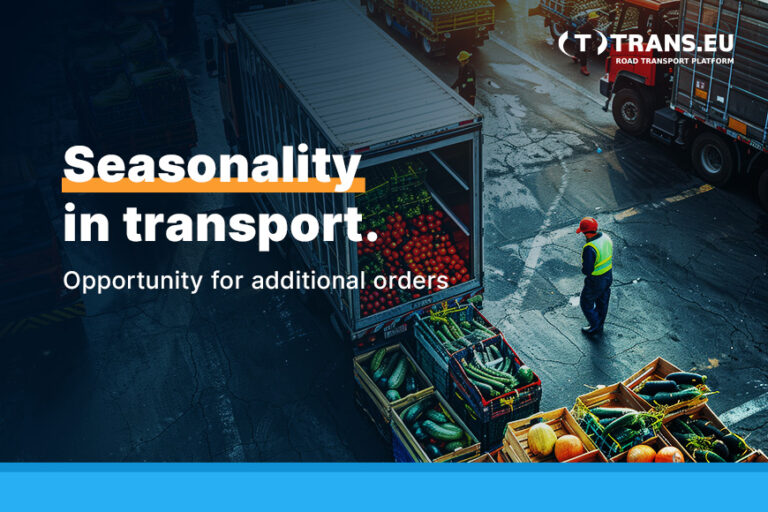Most of the supply chain experts interviewed had the same answer: it depends. For example, in the agroindustry, which deals with agricultural services, when the so-called high season (July – December) begins, there is a shortage of truck fleets. This is an additional opportunity for carriers to transport, for example, wheat and corn to the indicated port at a fair price. The same applies to the transport of onions, sweet peppers, tomatoes and other vegetables from the Netherlands and Belgium, because in spring and summer there is a boom in vegetables, greenhouse products and field crops.
The concept of seasonality has been somewhat blurred recently due to a shortage of vehicles in the market. In particular, seasonality has been preserved in the transport of fresh products requiring controlled temperature. This is beneficial for the TSL industry, because it generates a high demand for trucks, and additional carriers have to be looked for on the transport exchange. It also has an impact on the increase in freight prices.
Beniamin Matecki, logistics consultant and transport market expert
Summer break
Seasonality in transport has a very different face: demand can change periodically every year, month or even week. It also depends on the activity of certain manufacturing facilities, which tend to shut down in the summer. In Italy and Germany, for example, the summer months, especially the first half of August, mean a significant reduction in industrial production. Employees are put on leave and the plants undergo a technical inspection.
In the countries of Southern Europe (including the Iberian Peninsula), transport activity decreases in July and August because there is simply nothing to transport. As a rule, the volume of goods to be transported decreases during the summer holidays, although this does not apply to all industries. “The holiday period is usually the so-called dead season for our customers, and many manufacturing companies and sectors suspend or reduce their operations. This situation improves in autumn, when the demand for transport and forwarding begins to return to normal,” confirms Małgorzata Pawluczuk, leader of the ABC Czepczyński branch in Bielsk Podlaski.
Consumer sets trends
Traditionally, in the summer period, in addition to the intensive transport of fresh products, demand also increases in the FMCG sector and in the construction industry (although the latter is rather fragile, due to the decline in construction investments in Germany and other countries). Regardless of the condition of the European economies, the demand for beer, ice cream, soft drinks, etc. increases in every summer season. Thus, the demand for transport, usually refrigerated, but not only, increases at the same time.
This “summer” seasonality is confirmed by Jarosław Dłużak, president of Logiant, a logistics company. In the case of his company, however, it is not only beverages that are transported, but also the so-called white goods: during this time, he stores and transports more refrigerators and freezers. “Seasonality in transport is related to the specific needs of consumers. For example, in the spring we transport more gardening products because people return to their allotments, and in the late autumn there is an increase in the demand for Christmas balls and various decorative items,” reveals President Dłużak.
Contracts are not enough
From the point of view of a transport company, seasonality does not have to mean a forced stoppage of part of the truck fleet. You just have to look at the market and offer your services at the right time. It is also an opportunity to get a better price for freight by taking up an order on the freight exchange. Customers, i.e. manufacturing and trading companies, are looking for additional loading capacity in the period of increased demand. More and more often they are willing to pay a higher price for it.
Higher demand generates greater transport needs. Large batches of products often need to be transported in the short term, and contractual arrangements may not guarantee this. However, the manufacturer will have to pay a higher rate. Transport companies should be prepared for seasonal changes so that they can adapt their processes to changing demand.
Małgorzata Pawluczuk, leader of the ABC Czepczyński branch in Bielsk Podlaski.
Maersk disrupted seasonality
The events of recent years, the Covid-19 pandemic, inflation and the economic slowdown in Europe have also affected seasonal demand in transport. Supply chain disruptions are becoming more and more frequent, interrupting the traditional seasonality in the transport industry. Experts point out that one such event in the case of Poland, and even more closely integrated economies, is the withdrawal of Maersk, a Danish container giant, from direct deliveries to the port of Gdansk.
This decision has affected many transport and logistics companies in Europe, who must quickly adapt their logistics networks to ensure the continuity of the flow of goods. The discontinuation of direct deliveries does not only affect Gdansk, but also to several other European ports. On the one hand, it is an opportunity to obtain an additional order for European carriers, but on the other hand, it will interrupt the seasonality of deliveries in selected product groups.
Now some of the goods from Asia that used to come to Gdansk are delivered to Hamburg or other German ports, and from there the so-called feeders, i.e. smaller ships, bring them to Poland. Or the contractor will hire a transport company to pick up the container in Germany This change will extend the delivery time and cause an increase the total cost of transport.
Jarosław Dłużak, from Logiant
Opportunity for carriers
Recent years have brought many such unexpected turbulences that have an impact on the disruption of the current seasonality. In fact, every month brings market demand for a specific type of product. Carriers should carefully monitor market trends and meet customer expectations. Greater flexibility provides the opportunity to win more orders.
It is worth noting that some industries are more resistant to market fluctuations. These include e.g. FMCG, or fast-moving consumer goods. This group includes not only the aforementioned cold drinks or beer, but also basic necessities such as food, hygiene products, as well as over-the-counter medicines. Effective transport management should therefore take seasonality into account, but also look for regular orders in sectors and industries that are less dependent on the seasons.
It is worth remembering that seasonality is not only a threat to the carrier due to fluctuating demand, but also a good chance to win additional orders. First of all, those found on the freight exchange. The autumn period and the beginning of winter is a real boom of orders on the Trans.eu Platform. Expect a large number of available freights, but also higher rates. Increased consumer demand during the holiday season gives a chance for higher earnings.
It is also a good time to think about the next year and to better prepare for large fluctuations in transport demand. This is especially true since the beginning of the year is traditionally a period of temporary stagnation in the European economies, when demand for road transport (and transport in general) falls sharply.
The increased demand for free trucks and vans causes a greater interest of customers in the spot market, i.e. the freight exchange. Most offers can be found on the Trans.eu Platform. It is the most innovative exchange on the European market, providing access to approximately 8.5 million orders per month.
Shipping seasons. What is worth keeping in mind?
- ✅ Seasonality causes increased demand in certain industries and sectors of the economy. It is worth following this demand closely.
- ✅ Manufacturers and distributors look to the freight exchange for support at a time of increasing consumption, they do not focus solely on the contract market. From the point of view of a transport company, the exchange is a place to establish a long-term cooperation with the customer.
- ✅ In the summer, especially in July and August, production activity decreases in Southern Europe, Italy and Spain, among others. In Germany, the first half of August also brings the country’s industry to a standstill, as workers are sent on vacation and companies perform technical maintenance. It is worth keeping this in mind when planning your transport activities in these directions.
- ✅ The periodic drop in freight demand is worth taking advantage of for driver vacations. In the period of growth they will be needed in the transport company.
- ✅ It is worth observing the current changes in European and global supply chains. For example, the decision of Maersk, a global container tycoon, to abandon the direct deliveries to several ports, generates greater demand for transport services

- ✔️January-February. A period of stagnation in European trade, resulting in lower demandfor transport services. However, this is a good time to transport citrus, especially bananas, oranges, lemons and tangerines.
✔️ March, April, May. Demand for food, construction products and home furnishings increases. Exports of apples from Poland, which next to Italy is the largest producer of the fruit in Europe, are on the rise.
✔️June, July, August. High demand for soft drinks and beer, increased demand for the transport of vegetables from the Netherlands and Belgium, as well as demand for household appliances, mainly refrigerators and freezers. There is also an increased demand for garden products. The high season begins in the agroindustry, which serves agriculture (transport of grain and fertilizers). Note: the first half of August is a holiday period in the German and Italian industry.
✔️September. The beginning of post-holiday consumption growth, demand for office supplies increases (the start of the school year in many EU countries), the end of the high season for beverages and ice cream, the high season in the agroindustry continues.
✔️October, November and December. Peak consumption in Europe due to the holiday season. For example, the demand for the transport of Christmas trees from Denmark, the export of Christmas balls to Poland and selected citrus fruits grows rapidly. The increase in demand for transport affects many industries and products.
- Industries that generate demand for transport throughout the year:
- ✔️ FMCG, i.e. fast-moving consumer goods.
- ✔️ Fresh logistics – transport of products that require controlled temperature (fruit, vegetables), but also beef, pork and poultry).
- ✔️ Transport of pharmaceuticals





